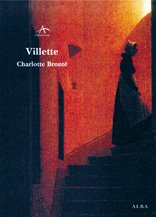
Rejoice! 152 after its original publication in England,
Villette has finally been translated wholly and loyally into Spanish. And about time, don't you think? Details:
Alba Editorial
Translation by Marta Salís
ISBN: 84 8428 283 X
31 €
648 pp.
HardcoverIf you are wondering how it came to take so long until its definitive translation, you might be interested in reading
this article (in Spanish) -
Lucy Snowe's Alienation in Charlotte Brontë's Villette - by María Jesús Lorenzo Modia, published in September 2002.
Here's a roughly translated excerpt from it:
An aspect which can clearly be seen in this work is the confrontation between what is English and Protestant and what is continental and Catholic. Villette represents a furious attack against Catholicism. That is, perhaps, the reason why the book was forbidden in Spain for a long time and there isn't any translation available in the market, since the only translation ever made dates from 1944 and has important changes and omissions, probably due to the existing censorship in Spain at the time and which have been previously analyzed (Lorenzo Modia, 1998). Charlotte Brontë reproduces in Villette the religious debate of Catholicism vs. Protestantism, so in vogue in 19th century England. What could be original in her approach is that it reveals a belligerant attitude towards Catholics; though, surprisingly, Lucy Snowe travels to a Catholic country in search for freedom, love and personal realisation, addresses a Catholic priest to be confessed and liberated from her deep anxiety when she roams aimlessly around the streets of this metaphoric Brussels, teaches at a school where everybody is a Catholic and in the end falls in love with a layman Jesuit. The obvious ambivalence in her attitude in a profound level is connected with the contradictory position between her and the world, which reflects an idea present in the Victorian society, considering reality as a fight between opposites.[...]
This is a filtered translation [the one dating from 1944]
when it comes to religious subjects and, therefore, the atrocious criticism towards the Jesuits as an Institution and Catholics in general made in the original by Charlotte Brontë is left out.If you find the subject interesting you might want to read further on it by getting a hold of the following article by the same author:
LORENZO MODIA, María Jesús. (1998) “Charlotte Brontë’s Villette Translated into Spanish: Censorship at Work”. Insights into Translation, Soto Vázquez, Adolfo Luis (Ed.) 113-122. A Coruña: Universidade da Coruña.In the meantime, you can celebrate that the Brontës are still new in many ways, and still very much in the publishing business!
Categories: Books, Villette, Charlotte_Brontë>, Translations









0 comments:
Post a Comment